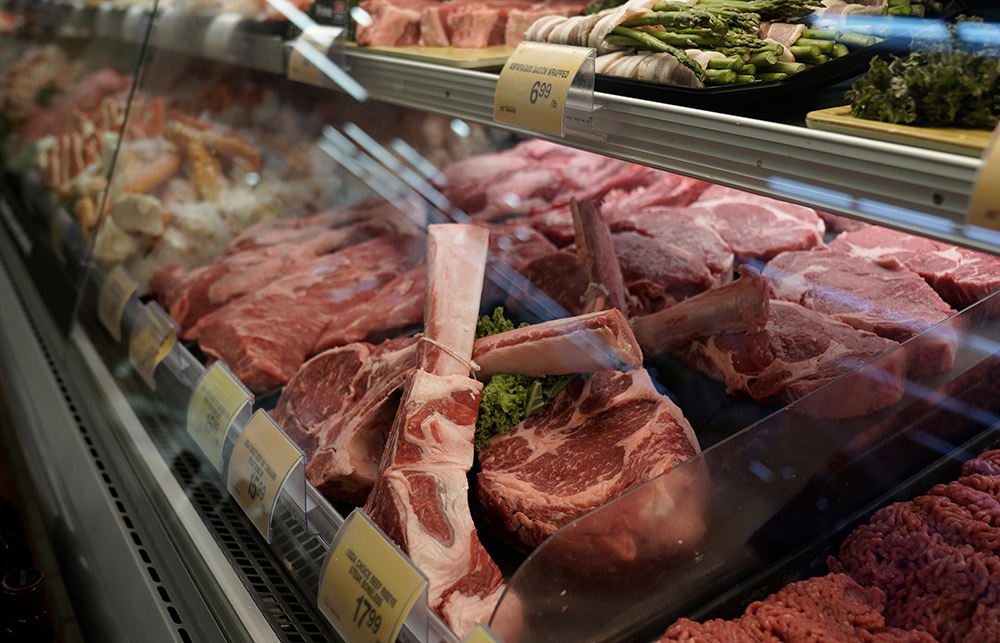
特朗普的競(jìng)選團(tuán)隊(duì)還沒(méi)有找到攻擊加州參議員賀錦麗(Kamala Harris)最好的切入點(diǎn):她是左翼極端分子,還是對(duì)民主黨進(jìn)步派不屑一顧的保守派,?
為了想方設(shè)法攻擊加州參議員賀錦麗,,美國(guó)副總統(tǒng)邁克?彭斯最近向牧場(chǎng)主們演講時(shí)拋出了“紅肉”這個(gè)議題,警告聽(tīng)眾賀錦麗想讓美國(guó)民眾無(wú)肉可吃,?!拔覀儾荒茏寙?拜登和賀錦麗減少美國(guó)的肉品供應(yīng)!”彭斯的話(huà)讓牧場(chǎng)主們一片歡呼,。
彭斯在提到賀錦麗作為總統(tǒng)候選人時(shí)曾經(jīng)表示,,我們應(yīng)該考慮食物選擇的環(huán)境影響。但一場(chǎng)疫情確實(shí)導(dǎo)致肉類(lèi)供應(yīng)短缺,,而且政府發(fā)布了要求屠宰場(chǎng)繼續(xù)營(yíng)業(yè)的行政命令,,因此肉類(lèi)供應(yīng)會(huì)影響大選這種觀(guān)點(diǎn)并非無(wú)稽之談。
事實(shí)上,,歷史上曾經(jīng)出現(xiàn)過(guò)這種情況,。
第二次世界大戰(zhàn)期間,美國(guó)人為了支持軍隊(duì)海外作戰(zhàn),,習(xí)慣了肉品定量配給,。后來(lái)戰(zhàn)爭(zhēng)結(jié)束,美國(guó)戰(zhàn)勝了德國(guó)和日本,,然后開(kāi)始飛速發(fā)展,,但肉類(lèi)供應(yīng)問(wèn)題依舊存在。
在戰(zhàn)時(shí),,由政府主導(dǎo)的肉價(jià)上限意味著許多農(nóng)戶(hù)擔(dān)心虧損,,因此選擇了停止生產(chǎn),但為了打敗軸心國(guó)這個(gè)共同的愿望,,美國(guó)人愿意忍受少肉的飲食,。
但戰(zhàn)爭(zhēng)結(jié)束后,政府取消肉價(jià)上限,,肉價(jià)不出意外地開(kāi)始飛漲,。1946年中期選舉期間,試圖拯救民主黨的時(shí)任總統(tǒng)哈里?杜魯門(mén)再次執(zhí)行肉價(jià)上限,,但這一次他無(wú)法再依靠愛(ài)國(guó)主義鼓動(dòng)農(nóng)戶(hù)們以難以為繼的低價(jià)格生產(chǎn)肉類(lèi),。
被此舉激怒的肉品行業(yè)游說(shuō)組織采取了報(bào)復(fù)措施,號(hào)召生產(chǎn)者停止把牲畜送到屠宰場(chǎng),。
《時(shí)代》周刊的埃米琳?路德在2016年回顧戰(zhàn)后事件時(shí)曾經(jīng)寫(xiě)道:“礦工們聲稱(chēng)沒(méi)有更多的肉,,他們無(wú)法工作,并開(kāi)始在華盛頓舉行罷工,。醫(yī)院稱(chēng)只能找到馬肉提供給患者食用,,讓丑聞進(jìn)一步發(fā)酵,。仍在營(yíng)業(yè)的肉店外排起的長(zhǎng)隊(duì)綿延幾個(gè)街區(qū),顧客彼此推搡撕扯,?!?/p>
整個(gè)國(guó)家處在危機(jī)的邊緣?!稌r(shí)代》周刊為此事發(fā)表過(guò)一篇社論,,形容這種情況是“蔓延的肉荒”,并將其直接歸咎于杜魯門(mén),。國(guó)會(huì)里的民主黨議員懇求杜魯門(mén)總統(tǒng)想辦法解決肉類(lèi)供應(yīng)危機(jī),,并將其作為選民最關(guān)注的問(wèn)題。而共和黨與今天的彭斯一樣,,開(kāi)始宣揚(yáng)支持肉類(lèi)供應(yīng)的信息,。
俄亥俄州共和黨議員約翰?沃里斯在競(jìng)選演講中問(wèn)道:“肉足夠嗎?”這句話(huà)很快成了選舉中的戰(zhàn)斗口號(hào),。共和黨議員山姆?雷伯恩甚至將1946年的中期選舉稱(chēng)為“牛排選舉”,,而且在很大程度上由于民眾對(duì)肉類(lèi)供應(yīng)短缺問(wèn)題的認(rèn)知,導(dǎo)致民主黨在參眾兩院均告失利,。
今天,,另一場(chǎng)肉類(lèi)供應(yīng)短缺同樣恰逢一場(chǎng)重要的選舉。但與1946年不同,,2020年,,美國(guó)的準(zhǔn)備更加充分,足以應(yīng)對(duì)肉類(lèi)短缺,。今天,,面對(duì)屠宰場(chǎng)臨時(shí)關(guān)閉,我們的應(yīng)對(duì)措施可能是永久轉(zhuǎn)變我們的飲食習(xí)慣,,改為食用植物,。
連鎖快餐店已經(jīng)開(kāi)始提供基于植物的人造漢堡肉,即使最頑固的肉食者,,包括報(bào)紙上的美食專(zhuān)欄作家,,都對(duì)這種食物贊嘆不已。大型肉類(lèi)企業(yè)本身也在開(kāi)發(fā)人造肉,,比如嘉吉(Cargill)已經(jīng)在中國(guó)開(kāi)賣(mài)人造雞肉,。Perdue Farms等公司提供的混合產(chǎn)品包含動(dòng)物和植物蛋白,這種產(chǎn)品降低了食物的生態(tài)足跡,,同時(shí)可以進(jìn)一步擴(kuò)大肉類(lèi)市場(chǎng)。(我的初創(chuàng)公司The Better Meat公司支持肉類(lèi)公司將動(dòng)物肉與植物蛋白配料混合,,而且我們向Perdue提供基于植物的配料,。)
我們有足夠的肉可以享用,,這或許是20世紀(jì)40年代中期的杜魯門(mén)和國(guó)會(huì)的民主黨人夢(mèng)想的世界。今天,,喬?拜登和民主黨可以安心,,因?yàn)槭称芳夹g(shù)的進(jìn)步使我們可以不依賴(lài)動(dòng)物生產(chǎn)人造肉食品,讓美國(guó)人能夠大快朵頤,,盡情滿(mǎn)足吃肉的欲望,。人造肉除了在疫情期間提供幫助以外,還有另外一個(gè)優(yōu)勢(shì):人造肉對(duì)地球和動(dòng)物有益,,并且其膽固醇含量為零,。
美國(guó)曾經(jīng)經(jīng)歷過(guò)肉類(lèi)短缺危機(jī)。雖然現(xiàn)在認(rèn)為賀錦麗想要這種情況再次上演或許有些可笑,,但我們應(yīng)該感到高興的是,,不同于杜魯門(mén)的時(shí)代,現(xiàn)在我們有更多選擇,,而且蛋白質(zhì)來(lái)源多樣化對(duì)人體有益,。(財(cái)富中文網(wǎng))
本文作者保羅?夏皮羅為《干凈的肉:人造肉的增長(zhǎng)將引發(fā)餐桌革命,改變?nèi)澜纭罚–lean Meat: How Growing Meat Without Animals Will Revolutionize Dinner and the World)一書(shū)的作者,,并擔(dān)任The Better MeatCo.公司的首席執(zhí)行官,。
譯者:Biz
2020年6月22日,位于圣迭戈的一家艾伯森(Albertsons)食品雜貨店里,,擺在肉類(lèi)攤位上的牛肉塊,。邁克?彭斯指責(zé)賀錦麗試圖讓美國(guó)人民無(wú)肉可吃。
特朗普的競(jìng)選團(tuán)隊(duì)還沒(méi)有找到攻擊加州參議員賀錦麗(Kamala Harris)最好的切入點(diǎn):她是左翼極端分子,,還是對(duì)民主黨進(jìn)步派不屑一顧的保守派,?
為了想方設(shè)法攻擊加州參議員賀錦麗,美國(guó)副總統(tǒng)邁克?彭斯最近向牧場(chǎng)主們演講時(shí)拋出了“紅肉”這個(gè)議題,,警告聽(tīng)眾賀錦麗想讓美國(guó)民眾無(wú)肉可吃,。“我們不能讓喬?拜登和賀錦麗減少美國(guó)的肉品供應(yīng),!”彭斯的話(huà)讓牧場(chǎng)主們一片歡呼,。
彭斯在提到賀錦麗作為總統(tǒng)候選人時(shí)曾經(jīng)表示,我們應(yīng)該考慮食物選擇的環(huán)境影響,。但一場(chǎng)疫情確實(shí)導(dǎo)致肉類(lèi)供應(yīng)短缺,,而且政府發(fā)布了要求屠宰場(chǎng)繼續(xù)營(yíng)業(yè)的行政命令,因此肉類(lèi)供應(yīng)會(huì)影響大選這種觀(guān)點(diǎn)并非無(wú)稽之談,。
事實(shí)上,,歷史上曾經(jīng)出現(xiàn)過(guò)這種情況。
第二次世界大戰(zhàn)期間,美國(guó)人為了支持軍隊(duì)海外作戰(zhàn),,習(xí)慣了肉品定量配給,。后來(lái)戰(zhàn)爭(zhēng)結(jié)束,美國(guó)戰(zhàn)勝了德國(guó)和日本,,然后開(kāi)始飛速發(fā)展,,但肉類(lèi)供應(yīng)問(wèn)題依舊存在。
在戰(zhàn)時(shí),,由政府主導(dǎo)的肉價(jià)上限意味著許多農(nóng)戶(hù)擔(dān)心虧損,,因此選擇了停止生產(chǎn),但為了打敗軸心國(guó)這個(gè)共同的愿望,,美國(guó)人愿意忍受少肉的飲食,。
但戰(zhàn)爭(zhēng)結(jié)束后,政府取消肉價(jià)上限,,肉價(jià)不出意外地開(kāi)始飛漲,。1946年中期選舉期間,試圖拯救民主黨的時(shí)任總統(tǒng)哈里?杜魯門(mén)再次執(zhí)行肉價(jià)上限,,但這一次他無(wú)法再依靠愛(ài)國(guó)主義鼓動(dòng)農(nóng)戶(hù)們以難以為繼的低價(jià)格生產(chǎn)肉類(lèi),。
被此舉激怒的肉品行業(yè)游說(shuō)組織采取了報(bào)復(fù)措施,號(hào)召生產(chǎn)者停止把牲畜送到屠宰場(chǎng),。
《時(shí)代》周刊的埃米琳?路德在2016年回顧戰(zhàn)后事件時(shí)曾經(jīng)寫(xiě)道:“礦工們聲稱(chēng)沒(méi)有更多的肉,,他們無(wú)法工作,并開(kāi)始在華盛頓舉行罷工,。醫(yī)院稱(chēng)只能找到馬肉提供給患者食用,,讓丑聞進(jìn)一步發(fā)酵。仍在營(yíng)業(yè)的肉店外排起的長(zhǎng)隊(duì)綿延幾個(gè)街區(qū),,顧客彼此推搡撕扯,。”
整個(gè)國(guó)家處在危機(jī)的邊緣,?!稌r(shí)代》周刊為此事發(fā)表過(guò)一篇社論,形容這種情況是“蔓延的肉荒”,,并將其直接歸咎于杜魯門(mén),。國(guó)會(huì)里的民主黨議員懇求杜魯門(mén)總統(tǒng)想辦法解決肉類(lèi)供應(yīng)危機(jī),并將其作為選民最關(guān)注的問(wèn)題,。而共和黨與今天的彭斯一樣,,開(kāi)始宣揚(yáng)支持肉類(lèi)供應(yīng)的信息。
俄亥俄州共和黨議員約翰?沃里斯在競(jìng)選演講中問(wèn)道:“肉足夠嗎,?”這句話(huà)很快成了選舉中的戰(zhàn)斗口號(hào),。共和黨議員山姆?雷伯恩甚至將1946年的中期選舉稱(chēng)為“牛排選舉”,,而且在很大程度上由于民眾對(duì)肉類(lèi)供應(yīng)短缺問(wèn)題的認(rèn)知,導(dǎo)致民主黨在參眾兩院均告失利,。
今天,,另一場(chǎng)肉類(lèi)供應(yīng)短缺同樣恰逢一場(chǎng)重要的選舉,。但與1946年不同,,2020年,美國(guó)的準(zhǔn)備更加充分,,足以應(yīng)對(duì)肉類(lèi)短缺,。今天,面對(duì)屠宰場(chǎng)臨時(shí)關(guān)閉,,我們的應(yīng)對(duì)措施可能是永久轉(zhuǎn)變我們的飲食習(xí)慣,,改為食用植物。
連鎖快餐店已經(jīng)開(kāi)始提供基于植物的人造漢堡肉,,即使最頑固的肉食者,,包括報(bào)紙上的美食專(zhuān)欄作家,都對(duì)這種食物贊嘆不已,。大型肉類(lèi)企業(yè)本身也在開(kāi)發(fā)人造肉,,比如嘉吉(Cargill)已經(jīng)在中國(guó)開(kāi)賣(mài)人造雞肉。Perdue Farms等公司提供的混合產(chǎn)品包含動(dòng)物和植物蛋白,,這種產(chǎn)品降低了食物的生態(tài)足跡,,同時(shí)可以進(jìn)一步擴(kuò)大肉類(lèi)市場(chǎng)。(我的初創(chuàng)公司The Better Meat公司支持肉類(lèi)公司將動(dòng)物肉與植物蛋白配料混合,,而且我們向Perdue提供基于植物的配料,。)
我們有足夠的肉可以享用,這或許是20世紀(jì)40年代中期的杜魯門(mén)和國(guó)會(huì)的民主黨人夢(mèng)想的世界,。今天,,喬?拜登和民主黨可以安心,因?yàn)槭称芳夹g(shù)的進(jìn)步使我們可以不依賴(lài)動(dòng)物生產(chǎn)人造肉食品,,讓美國(guó)人能夠大快朵頤,,盡情滿(mǎn)足吃肉的欲望。人造肉除了在疫情期間提供幫助以外,,還有另外一個(gè)優(yōu)勢(shì):人造肉對(duì)地球和動(dòng)物有益,,并且其膽固醇含量為零。
美國(guó)曾經(jīng)經(jīng)歷過(guò)肉類(lèi)短缺危機(jī),。雖然現(xiàn)在認(rèn)為賀錦麗想要這種情況再次上演或許有些可笑,,但我們應(yīng)該感到高興的是,不同于杜魯門(mén)的時(shí)代,,現(xiàn)在我們有更多選擇,,而且蛋白質(zhì)來(lái)源多樣化對(duì)人體有益。(財(cái)富中文網(wǎng))
本文作者保羅?夏皮羅為《干凈的肉:人造肉的增長(zhǎng)將引發(fā)餐桌革命,改變?nèi)澜纭罚–lean Meat: How Growing Meat Without Animals Will Revolutionize Dinner and the World)一書(shū)的作者,,并擔(dān)任The Better MeatCo.公司的首席執(zhí)行官,。
譯者:Biz
The Trump campaign has yet to figure out the best line of attack on Sen. Kamala Harris: Is she a left-wing extremist or a snub to the progressive wing of the Democratic Party?
In throwing the kitchen sink at the California senator, Vice President Mike Pence recently tried out some red meat on a crowd of ranchers, warning them that Harris wants to take their meat away. “We’re not going to let Joe Biden and Kamala Harris cut America’s meat!” Pence declared to the ranchers’ adoration.
Pence was referring to then-Presidential candidate Harris’s assertion that we should consider the environmental effects of our food choices. But in a time when we’ve experienced an actual pandemic-induced meat shortage along with an executive order aimed at keeping slaughtering plants open, the idea of meat availability playing a role in the election isn’t so farfetched.
In fact, it’s happened before.
During World War II, Americans became accustomed to meat rationing as part of the effort to support the troops abroad. When the war ended, the country was obviously flying high after its victory over Germany and Japan, but the problem of meat availability remained.
Wartime government-induced price ceilings on meat meant that many farmers simply chose not to produce for fear of losing money, but Americans were willing to endure the less-meat diet out of a shared desire to defeat the Axis enemies.
When the war ended, however, those ceilings were lifted, and unsurprisingly the price of meat skyrocketed. In the midst of the 1946 midterm elections, President Harry Truman, trying to save the Democratic Party, moved to enforce price ceilings again, but this time without the ability to rely on patriotism to encourage farmers to produce meat for untenably low prices.
Enraged, the meat lobby retaliated by having producers again cease sending animals to slaughter.
As Time’s Emelyn Rude wrote in 2016 of the postwar incident, “Miners declared they could not work without more meat and began striking in Washington. Hospitals stirred scandal by claiming they could only find horsemeat to serve their sick patients. The lines outside the butcher shops still in operation stretched for blocks and provoked shoving and scratching amongst the patrons.”
The country was on edge. Time itself even editorialized on the topic, blaming what it called the “widespread meat famine” directly on Truman. Congressional Democrats begged the President to do something about the meat crisis, declaring it the single biggest issue of concern to their constituents. The Republicans, just like Pence today, campaigned on a pro-meat message.
“Got enough meat?” asked Rep. John Vorys, a Republican from Ohio, in a campaign speech, a slogan which quickly came to be an election rallying cry. Rep. Sam Rayburn even dubbed the midterm election of 1946 the “beefsteak election,” and in substantial part owing to the perception of a meat shortage, Democrats lost control of both chambers of Congress.
Today, another meat shortage has coincided with an important election. But unlike in 1946, our nation in 2020 is better prepared to withstand a scarcity of animal protein. Today, our response to the temporary closing of slaughter plants can be a permanent opening of our dietary habits to actual plants.
Already, fast food chains are offering plant-based burgers that routinely wow the most inveterate carnivores, including newspaper food writers. Meat giants themselves are now the purveyors of plant-based meat, with companies like Cargill selling their plant-based chicken even in China. Others like Perdue Farms are offering blended products that are hybrids of both animal and plant proteins, lowering the ecological footprint of the food while helping meat go much further. (My startup, The Better Meat Co., enables meat companies to hybridize their animal meats with plant protein ingredients, and we provide plant-based ingredients to Perdue.)
Such a world—where we can essentially have our meat and eat it too—would have been a dream come true for President Truman and congressional Democrats in the mid-1940s. Today, Joe Biden and Democrats can rest assured that thanks to advances in food technology enabling us to produce meaty foods with less reliance on animals, Americans will be able to satiate our meat tooth all we want. And in addition to helping during the pandemic, plant-based meats also have the advantage of being better for the planet and animals, and having zero cholesterol, too.
Our nation has faced meat shortages in the past. While it may be laughable to think that Kamala Harris wants such an outcome again, we should just be glad that unlike in Truman’s day, we now have far more options, and diversifying our protein sources is good for us anyway.
Paul Shapiro is the author of Clean Meat: How Growing Meat Without Animals Will Revolutionize Dinner and the World and the CEO of The Better Meat Co.






